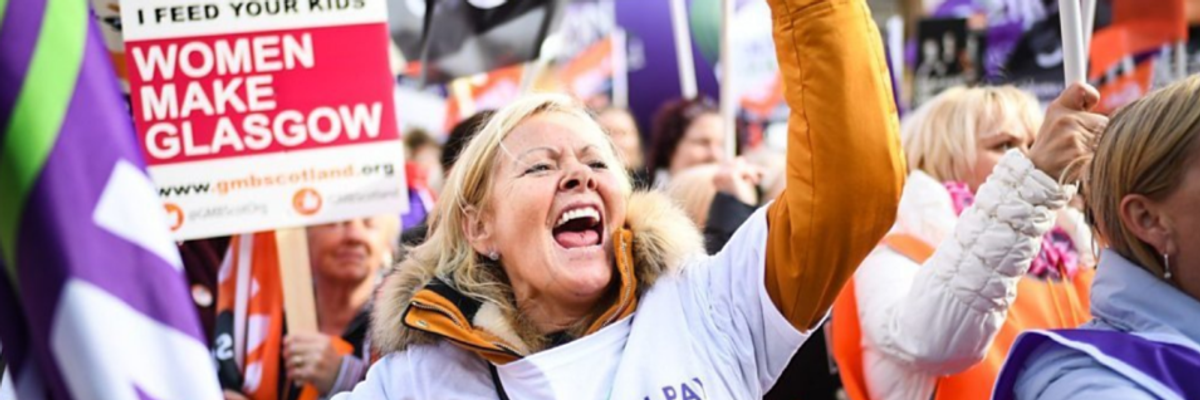Thousands of mostly-female city workers began a two-day strike on Tuesday in Glasgow, Scotland, demanding equal pay after living under an unfair pay scale for more than a decade and spending nearly a year negotiating with the city council.
With about 8,000 protesters marching through the city, employees are demanding a long-awaited resolution to talks that began 10 months ago after the Court of Session ruled last year that the city council had set an unfair pay scheme for the city's workers in food services, custodial work, and home care--paying those in the female-dominated sectors less than those in male-dominated areas.
"The voice of Glasgow's working women will be heard around the world," Rhea Wolfson, an organizer with the union GMB Scotland, told the BBC. "After decades of rampant sex discrimination they will tell their employer, 'Stop the delays. We want justice.'"
The city's compensation scale was set in 2006, and women working in schools, home care, and other are paid as much as three pounds or nearly four U.S. dollars less than their male counterparts under the plan, according to the Herald. Some women working for the city take home PS4,000 or more than $5,000.
Last May, just before the Scottish National Party (SNP) took the helm of the council after years of Labour control, the court's ruling set off nearly two dozen negotiation meetings between the council and the workers' unions began, but employees say the talks have gone nowhere.
"Equal pay isn't a gift from your employer, it's a right that you fight for." --Rhea Wolfson, GMB Scotland
"Last year the courts agreed with us that the council's pay scheme was unequal and invalid and we were sent back to negotiate a new pay scheme and settlement of equal pay claims for thousands of women across Glasgow," Mandy McDowall, an organizer with the union Unison, told the Herald. "In ten months and 21 meetings of negotiations we have got nowhere. There is no detail on the table that allows us to have confidence that the council will meet the deadline of December that was equally set."
Primary schools were closed Tuesday and about 6,000 home care clients in the city were without support for the day--but at least one client appeared at the demonstration in solidarity with the employees who have cared for her.
About 600 men who also work for the city--in fields including sanitation, street cleaning, and road construction--also turned out to express support for their female colleagues.
A number of prominent political figures in the U.K. expressed support for the workers, including Labour Party leader Jeremy Corbyn.
Scottish First Minister Nicola Sturgeon also spoke out in favor of the strike, but rejected the local Labour Party's sentiments--noting that the party was in control of the city council when it fought against equal pay measures, resulting in last year's court case and the ongoing negotiations.
"You've suffered ten years of discrimination and we need to be clear: the only thing that will remedy this is you taking action," Wolfson said. "That's why we're here today... Equal pay isn't a gift from your employer, it's a right that you fight for."




